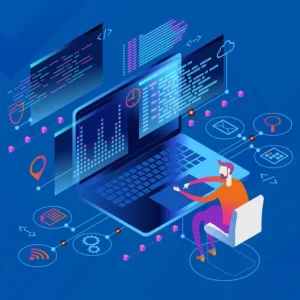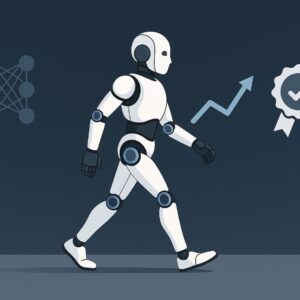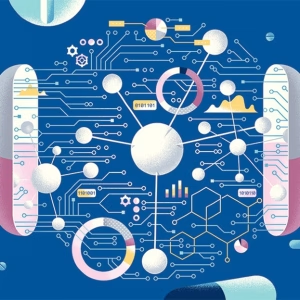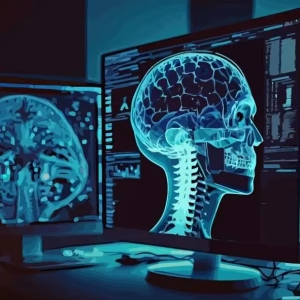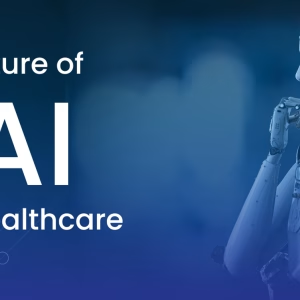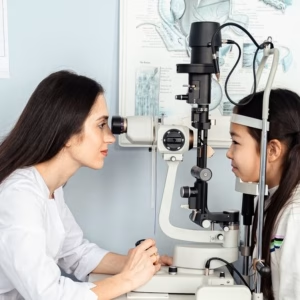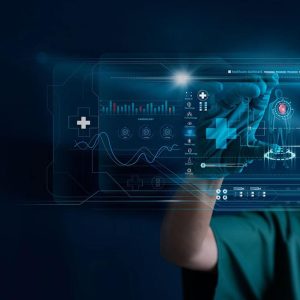Artificial Intelligence (AI) has emerged as a transformative force in the healthcare industry, revolutionizing the way medical professionals diagnose, treat, and manage diseases. By leveraging advanced algorithms and machine learning techniques, AI has the potential to enhance patient outcomes, streamline workflows, and improve overall healthcare delivery. In this article, we will explore the various types of artificial intelligence in healthcare applications that will change its landscape.
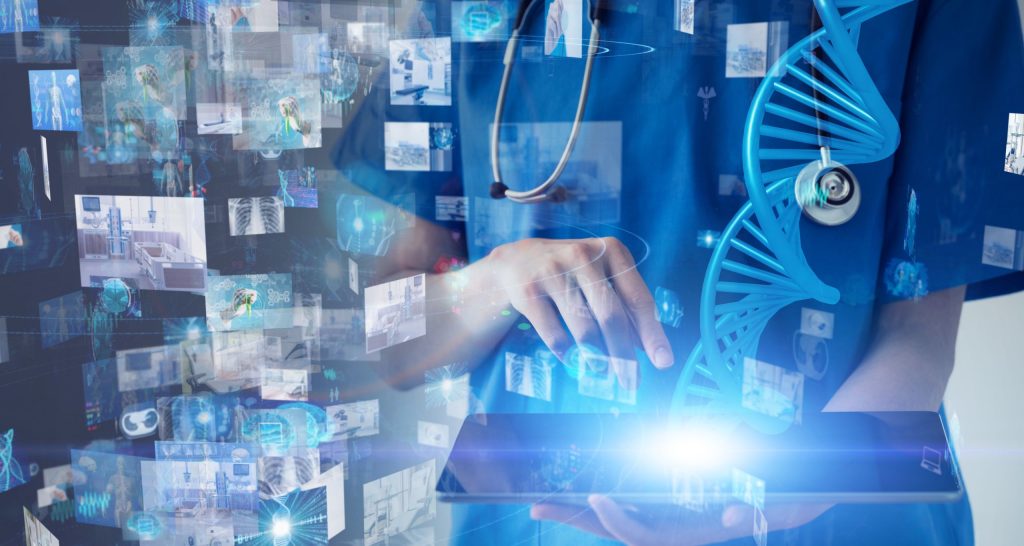
Diagnostic AI Systems
Diagnostic AI systems analyze medical imaging data, such as X-rays, MRIs, and CT scans, to assist radiologists and clinicians in detecting abnormalities and making accurate diagnoses. These systems utilize deep learning algorithms to interpret complex images and identify patterns indicative of diseases or conditions. By providing rapid and accurate diagnoses, diagnostic AI systems can help healthcare professionals make timely treatment decisions, leading to improved patient outcomes and reduced diagnostic errors.
Predictive Analytics
Predictive analytics represents a powerful application of artificial intelligence (AI) in healthcare, offering insights into future health outcomes and potential risks for patients. By leveraging AI algorithms to analyze diverse datasets including electronic health records (EHRs), genomic information, and clinical data, predictive analytics can identify individuals at elevated risk of developing specific diseases such as diabetes or heart disease. Armed with this predictive capability, healthcare providers can proactively intervene with preventive measures and personalized interventions tailored to each patient’s unique risk profile, thereby improving health outcomes and reducing the burden of disease.
Furthermore, predictive analytics plays a crucial role in optimizing hospital resource utilization by forecasting patient admissions and enabling more efficient allocation of resources, ultimately enhancing patient flow and improving the overall efficiency of healthcare delivery. As predictive analytics continues to evolve and integrate into clinical practice, it holds the promise of transforming healthcare by enabling proactive and personalized care while optimizing resource allocation to meet the needs of patients and healthcare organizations alike.
Personalized Medicine
Personalized medicine utilizes AI-driven algorithms to tailor medical treatments and interventions to individual patient characteristics, such as genetics, lifestyle, and environmental factors. By analyzing large-scale genomic and molecular data, AI can identify biomarkers and genetic variants associated with specific diseases or drug responses. This enables healthcare providers to develop personalized treatment plans that are more effective and tailored to each patient’s unique needs. Personalized medicine holds the potential to revolutionize disease management by optimizing treatment efficacy, minimizing adverse effects, and improving patient adherence.
Virtual Health Assistants
Virtual health assistants, powered by AI and natural language processing (NLP) technologies, provide patients with personalized health information, support, and guidance. These AI-driven chatbots or virtual assistants can engage in real-time conversations with patients, answering questions, providing medical advice, and assisting with appointment scheduling. Virtual health assistants enhance patient engagement, enable remote monitoring, and promote self-management of chronic conditions. By delivering timely and accessible healthcare information, virtual health assistants empower patients to take control of their health and well-being.
Drug Discovery and Development
The field of drug discovery and development is undergoing a profound transformation with the integration of artificial intelligence (AI) technologies. AI is revolutionizing this process by expediting the identification of novel drug candidates and optimizing drug design in ways previously unattainable. Through the analysis of vast datasets encompassing genomics, proteomics, and chemical structures, AI algorithms have the capability to predict drug-target interactions and identify potential therapeutic compounds with remarkable precision.
By harnessing machine learning models and computational simulations, AI streamlines the drug discovery pipeline, significantly reducing the time and costs traditionally associated with drug development. Moreover, AI-driven drug repurposing strategies leverage existing drugs with known safety profiles to expedite the development of treatments for various diseases, offering a promising avenue for accelerating therapeutic innovation and addressing unmet medical needs. As AI continues to advance, its transformative impact on drug discovery and development holds the potential to revolutionize the pharmaceutical industry and improve patient outcomes on a global scale.
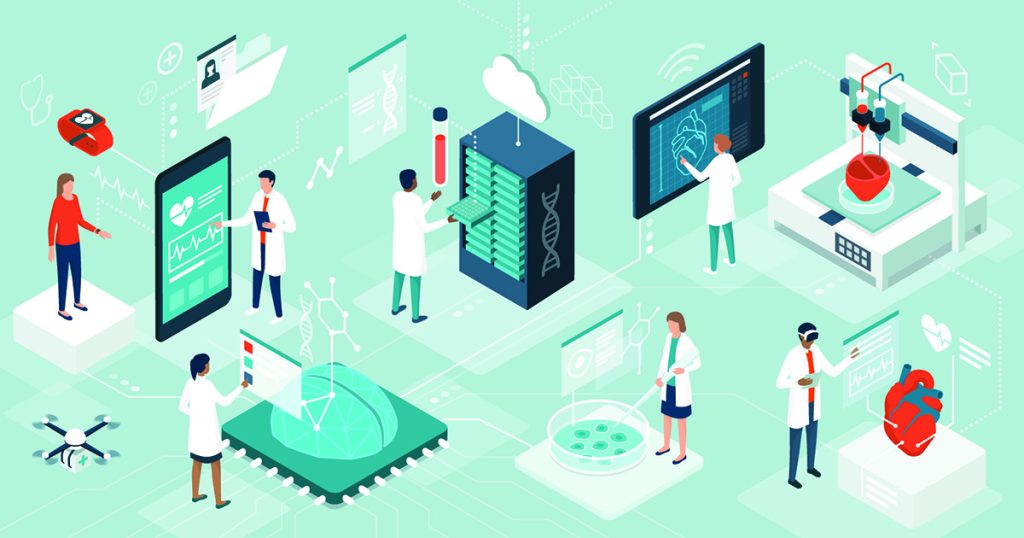
Remote Patient Monitoring
Remote Patient Monitoring (RPM) has emerged as a pivotal component of modern healthcare delivery, leveraging AI-enabled devices and sensors to track patients’ health status and vital signs remotely. By continuously collecting real-time data, including heart rate, blood pressure, and glucose levels, RPM enables healthcare providers to monitor patients’ health outside of traditional clinical settings. AI algorithms play a crucial role in analyzing the collected data, detecting anomalies, trends, or potential health risks, and alerting healthcare professionals to intervene promptly. This proactive approach not only improves patient access to care but also enhances disease management and reduces hospital readmissions by enabling early detection of complications and timely interventions, ultimately leading to better patient outcomes and improved quality of life.
The implementation of Remote Patient Monitoring has revolutionized healthcare delivery by enabling personalized and proactive care for patients, especially those with chronic conditions or complex medical needs. By remotely monitoring patients’ health parameters and providing timely interventions, RPM empowers patients to actively participate in their own care while allowing healthcare providers to deliver more efficient and effective interventions. Furthermore, RPM facilitates the shift towards value-based care models by promoting preventive measures and reducing unnecessary healthcare utilization, ultimately leading to cost savings and improved patient satisfaction. As technology continues to advance and AI algorithms become more sophisticated, Remote Patient Monitoring is poised to play an increasingly vital role in transforming healthcare delivery and improving patient outcomes on a global scale.
Conclusion
In conclusion, artificial intelligence (AI) is profoundly reshaping the healthcare landscape, offering transformative solutions across various applications. Diagnostic AI systems enhance accuracy and efficiency in disease detection, while predictive analytics enables proactive interventions to improve patient outcomes.
Personalized medicine tailors treatments to individual characteristics, virtual health assistants provide accessible support, and AI-driven drug discovery accelerates therapeutic development. Remote patient monitoring facilitates proactive care outside clinical settings. Together, these AI-driven innovations hold immense promise for revolutionizing healthcare delivery, improving patient outcomes, and advancing medical science.

